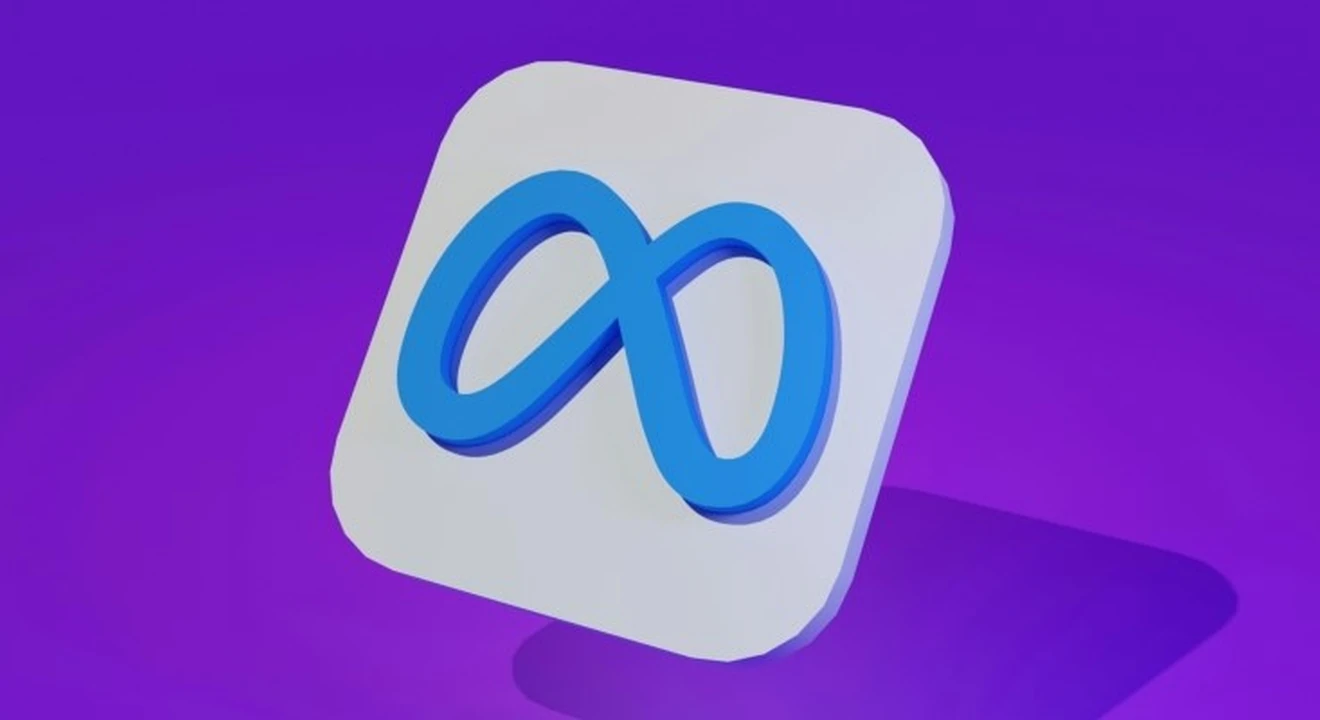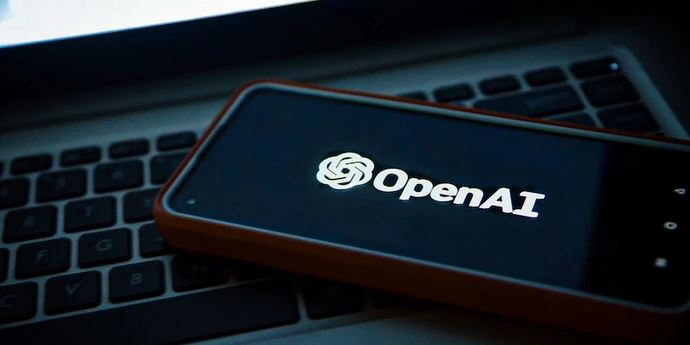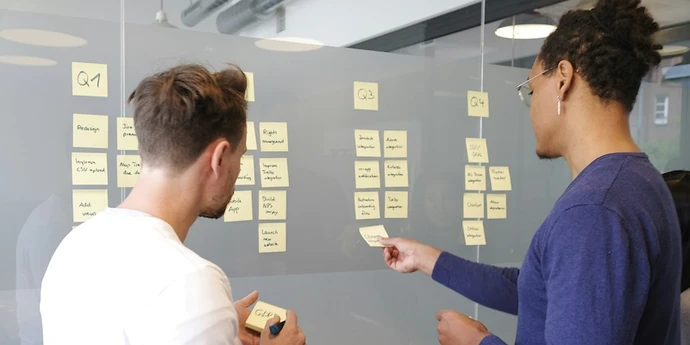In this guide, we’re going to cover everything you need to know to prepare for product manager (PM) interviews at Meta.
We’ve gathered insights from ex-Meta PM interviewers on our platform, successful candidates we've worked with, hundreds of reports from Meta candidates on Glassdoor, as well as information from official Meta sources, in order to put together this guide.
You’ll also find information on the new Product Sense with AI round, which tests your ability to apply AI in product design and strategy.
Below you’ll find a detailed overview of the interview process, example questions, how to answer, and a preparation plan.
- Role and salary
- Process and timeline
- Example questions
- Meta PM interview grading rubrics
- Interviewing tips
- Preparation plan
Click here to practice 1-to-1 with Meta ex-interviewers
Let’s get started.
1. Meta product manager role and salary↑
Before we cover your PM interviews at Meta, let's take a quick look at the role itself (alternatively, feel free to skip straight to the sections on the interview process or interview questions).
1.1 What does a Meta product manager do?
Product managers at Meta are responsible for the supervision of the product team’s content design, user research, and data analysis. In certain cases, the scope may also include product marketing and program management.
Two things are unique about being a product manager at Meta.
1. You get a lot of autonomy
When we speak to product managers who've worked at Meta, they often tend to talk about autonomy.
"Compared with other companies I've worked at (including eBay and Microsoft), Meta gives more autonomy to its product managers. It allows you to become a true owner of your product area." Astika, former senior PM at Meta.
Meta has traditionally upheld a bottom-up culture, and although it has become a blend of top-down and bottom-up approaches in recent years, a great deal of autonomy is still granted to PMs. This means that rather than just focusing on execution, you'll be able to set the "ground up" strategy for your area, especially if you're a senior product manager.
2. Things move fast
Autonomy for PMs is also encouraged by Meta's "Move fast" culture, which still holds strong and means that you can usually get things done at Meta as a PM more quickly than you would be able to at any other FAANG company.
"Meta is an amazing place to work as a Product Manager. You get to work with amazing engineers, designers, data scientists, and much more. They have an unparalleled experimentation platform (in my opinion), and also move faster than any company I have ever worked at." Mark R, former Meta and Google PM.
What does Meta look for in its product managers?
"Above all, Meta is looking for the following: strong product strategy skills, ability to thrive in chaos due to changing priorities, strong prioritization skills, ability to say no often, strong cross-functional collaboration, and strong communication skills at all levels." Astika, former senior PM at Meta.
1.2 Meta product manager salary and compensation
Meta PMs make 45.6% more than other PMs in the US, based on computations from Levels.fyi and Glassdoor data.
Below you can see the average salary and compensation of the different product manager levels at Meta, as of January 2026.
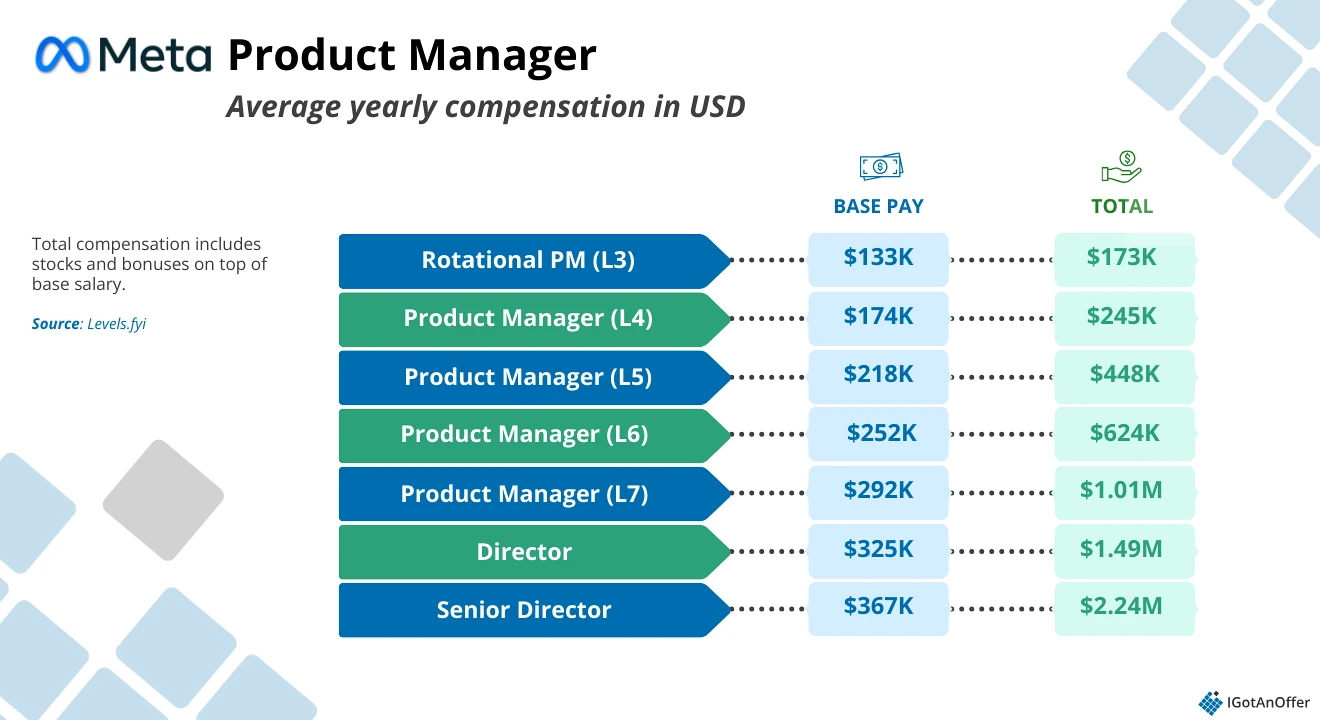
Compensation at Meta mainly depends on two key factors: location and level.
Location: Salaries are adjusted for cost-of-living. For example, Meta PMs in the US make 46% more than their counterparts in India (source: Glassdoor data).
Level: Both base salary and total compensation increase with each PM level. Meta Senior PMs (L6 and L7) even have a higher total compensation than Google’s senior PMs (source: Levels.fyi)
If you’re unsure what level you’re being considered for, ask your recruiter.
Ultimately, how you do in your interviews will determine what level you’re offered. That’s why hiring one of our Meta PM interview coaches can provide such a significant return on investment.
And remember, compensation packages are always negotiable, even at Meta. So, if you do get an offer, don’t be afraid to ask for more using our Meta salary negotiation guide and PM salary negotiation guide.
2. Meta PM interview process and timeline ↑
2.1 What interviews to expect
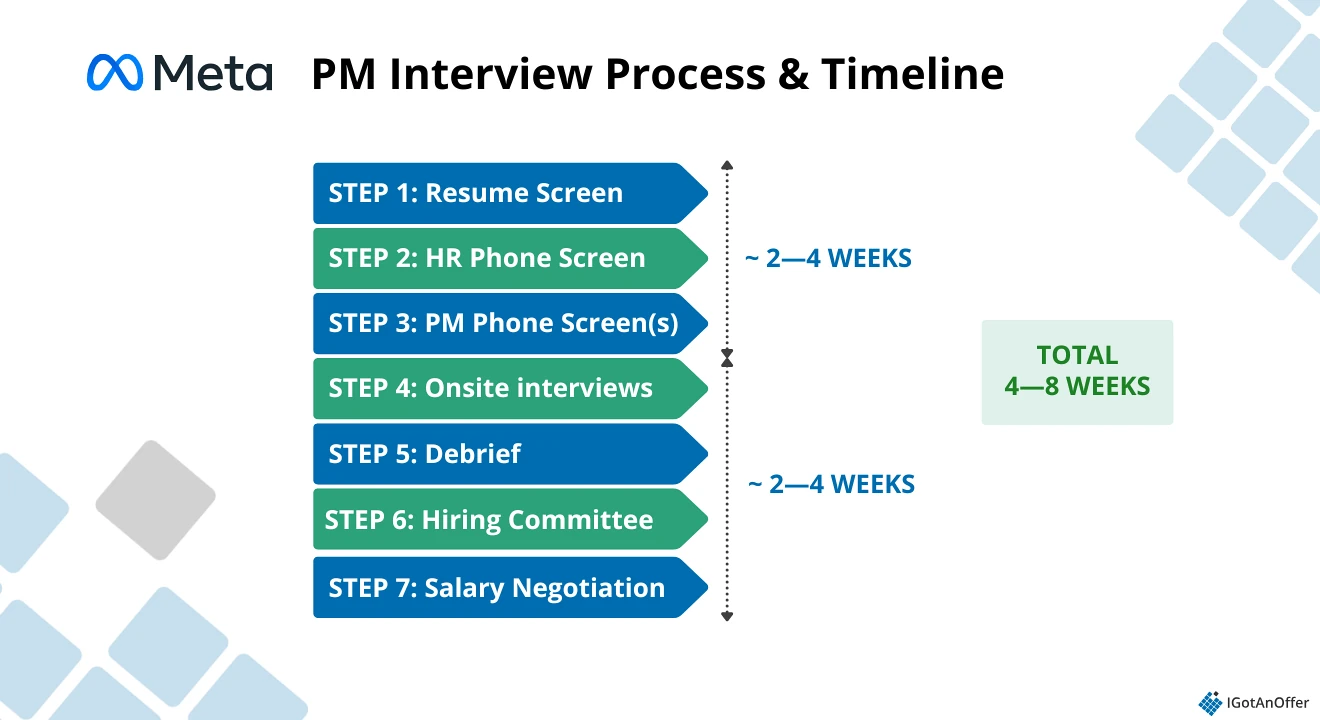
What's the Meta PM interview process and timeline? Generally, it takes four to eight weeks on average. The screening process follows these steps:
- Resume, cover letter, and referrals
- HR phone screen: one interview
- PM phone screen: two interviews
- PM full loop: four interviews
There will then be a debrief about your application and interview performance.
If you're successful, your recruiter will endorse your interviewers' recommendation to the hiring committee, who will then determine your level and how much you'll be offered. After which, you'll go through a salary negotiation.
Let's look more closely at each step of the screening process.
Resume Screening
First, recruiters will look at your resume and assess if your experience matches the open position. This is the most competitive step in the process—we’ve found that ~90% of candidates don’t make it past this stage.
You can use this free PM resume guide to help tailor your resume to the position you’re targeting. You can also take a look at real Meta resume examples.
And if you’re looking for expert feedback, you can also get input from our team of ex-Meta recruiters, who will cover what achievements to focus on (or ignore), how to fine-tune your bullet points, and more.
HR Phone Screen
Next, you'll start your interview process by talking to an HR recruiter on the phone. They are looking to confirm that you've got a chance of getting the job at all, so be prepared to explain your background and why you’re a good fit at Meta.
You should expect typical behavioral and resume questions like, "Tell me about yourself," "Why Meta?" or "Tell me about a product you launched from start to finish."
PM Phone Screen / Full Interview Loop
If you get past this first HR screen, the recruiter will then help schedule the first interview, which will be done over the phone with Meta PMs. One great thing about Meta is that it's very transparent about the recruiting process.
Your HR contact will therefore walk you through the types of questions interviewers will ask in subsequent rounds and also share this helpful Meta PM interview guide with you.
Each interview you do with Meta will take 45mins and follow one of three themes:
- Product sense, where you'll be tested on your product design and strategy skills
- AI product sense, where you’ll be tested on how well you apply AI to solve user problems, guide its outputs, and decide when AI makes sense.
- Analytical thinking (Execution), where you'll be tested on your ability to set goals, analyze data, and prioritize.
- Leadership & Drive, where you'll be asked to demonstrate that you are an empathetic leader
At the phone screen stage, you will typically get one Product Sense and one Analytical Thinking interview. And at the full loop stage, you will typically get one of each type of interview (four in total).
If you're applying for Meta's entry-level Rotational Product Manager program, the interview process is similar. You can learn more about it in our Meta RPM interview guide.
If you are interviewing for a product leadership position (VP, Director, Group PM), learn more about the process and how to prepare in this PM leader interview prep guide.
Or, if you're interviewing for an AI-focused PM role, check out our guide to AI product manager interview questions to see what kinds of questions you might get asked.
2.2 What happens behind the scenes at Meta
Your recruiter is leading the process and taking you from one stage to the next. Here's what happens at each of the stages described above:
- After the PM phone screen, the two interviewers you've talked to have 24h to submit their ratings and notes to the internal system. Your recruiter then reviews the feedback and decides to move you to the full loop interview or not, depending on how well you've done.
- After the PM full loop, the four interviewers will make a recommendation on hiring you or not, and the recruiter compiles your "packet" (interview feedback, resume, referrals, etc.). If they think you can get the job, they will present your case at the next hiring committee.
- The hiring committee includes senior leaders from across Meta. They will review your packet and make a final decision based on all the data points that have been collected about you in the process. The committee also sets your level and, therefore, compensation.
It's also important to note that hiring managers and people who refer you have little influence on the overall process. They can help you get an interview at the beginning, but that's about it.
3. Meta product manager interview questions ↑
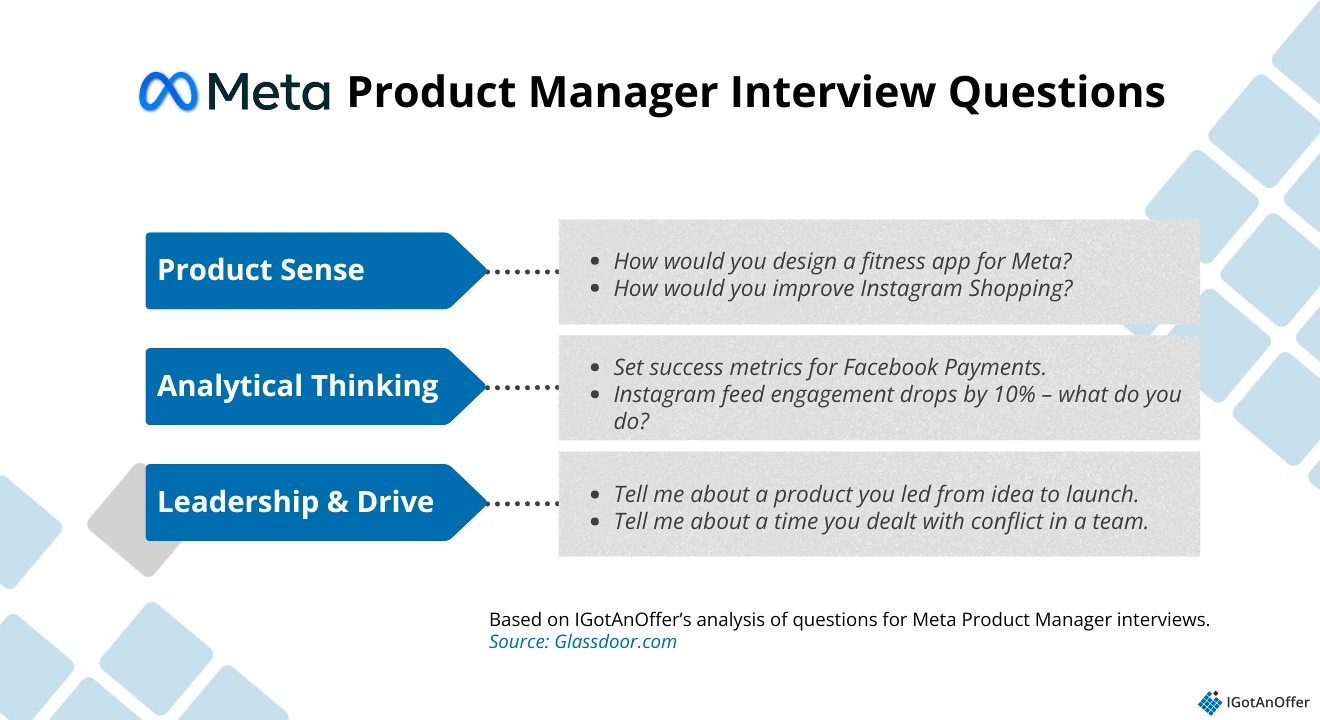
Let's dive in and look at the four types of interviews you can expect at Meta: Product sense, Product sense with AI, Analytical thinking, and Leadership & drive.
We've analyzed hundreds of questions reported by former Meta PM candidates on Glassdoor and laid out some typical questions for each interview type for you below.
3.1 Product sense interview questions ↑
Meta PMs decide what problems their teams work on and help design solutions for these problems. It's therefore important that they have strong product design and product strategy skills.
This is the part of the interview process where you should show that you're obsessed with the user. Here are a few of the skills Meta is looking for when asking product sense questions.
- How you identify who to build for and what their needs are
- How you focus on creating value and impact
- How you make intentional design choices
- How you handle critique, constraints, and new data
Product sense questions are often extremely open-ended, and this is intentional, as one of our Meta experts explained.
Philip (ex-product lead at Meta) says these questions are designed to force MECE (mutually exclusive, collectively exhaustive) thinking. For example, if you’re asked to design a product around sports, the first step is to clarify what “product around sports” actually means.
He adds that candidates are expected to “sharpen and narrow a nebulous problem, just as they’ll need to do in real life if they get the job.”
Let’s go through some sample questions.
Example of product sense questions asked by Meta
Product design
- How would you build Uber for kids?
- How would you build a fitness app for Meta?
- How would you design an app for an amusement park?
- Build a product for Facebook farmers
- Build a product for group travel
- How would you design an app for pet owners?
- Design a new experience for a grocery store.
- How would you design a new feature for an existing Meta product?
Product improvement
- How would you improve user engagement for a specific Meta product?
- Pick any Meta product - how would you improve it?
- How would you improve Instagram Shopping?
- How would you improve Facebook Campus?
- How would you improve Facebook Groups?
- A grocery store (Trader Joe’s) is experiencing a drop in sales due to increased competition from online shopping and delivery services. How would you design a feature or product to address this problem?
Product strategy
- Should Meta add a product for museums and their visitors?
- How would you monetize WhatsApp?
- How would you monetize Facebook Messenger?
- If you were PM for a supermarket, what would you build?
- How do you set up a grocery store? How will it be different and competitive?
- How would you decide to create a podcasting app for a competitor?
- Tell me what you think Airbnb should do to advance its strategy and compete further in the Experiences space?
When you're ready to deep dive into this part of the interview, check out our comprehensive guide to the Meta product sense interview.
We also recommend studying the articles we've written on each topic to learn how to answer these kinds of questions in a structured and impactful way:
If you’re applying for an L7+ product sense or strategy interview, you may want to review Nancy Chu’s video on 10x product thinking. In it, she explains how to use the product–market expansion grid to develop 10x thinking and demonstrate creativity and leadership in your interview.
3.2 AI product sense interview questions ↑
In addition to the typical product sense questions, you may also encounter product sense interviews with an AI focus, according to this LinkedIn post.
AI product sense questions test how well you collaborate with Meta’s AI products, including your ability to guide the AI and critically evaluate its outputs. You should also be able to explain when and why using AI makes sense for a given situation.
According to Alan (ex-Meta lead product manager), candidates interviewing for a specific domain (in this case, AI) should be expected to either speak with a domain expert or receive product sense questions tailored to that domain.
Example of AI product sense questions asked by Meta
- You are a Meta PM for AI chat. How would you define success and goals for it?
- You're the sole PM for Zoom. Imagine that AI is sending transcripts of meeting notes to all invitees, and suddenly, meeting attendance is down. What do you do?
3.3 Analytical thinking / execution interview questions ↑
Once PMs have decided what problem to solve and what features to build, it's time to execute! This round used to be known as the "Execution" interview, but is now called "Analytical Thinking."
Meta prides itself on being a data-driven organization. In fact, out of all the top tech companies, Meta is probably the one that focuses most on metrics.
"If you're into metrics, you'll learn so much more at Meta than you will in your entire career elsewhere." Mark R, ex-Meta product manager.
Therefore, you can expect the execution interview to focus on metric questions, but you'll also be tested on how you prioritize and approach trade-offs. Here are a few of the things Meta is looking for when asking execution questions:
- How you set the right goals for a product and measure against them
- How you identify, frame, and evaluate trade-offs and priorities
- How you analyze and debug problems
- How you set your team up for success
We've listed some very typical execution questions asked by Meta since 2022, according to data from Glassdoor. Once again, it's a good idea to develop a framework to answer these questions.
Example of analytical thinking questions asked by Meta
Metric definition
- Set success metrics for Facebook marketplace
- Set success metrics for Facebook payments
- Set success metrics for Instagram Shops
- Measure the success of Facebook Live
- How will you measure the success of a video conferencing product (like Zoom)?
- What should be the goal for Meta Pay? What should be the metric?
- What should be the goal for Meta Pay? What should be the metric?
- You are a PM for Horizon Worlds. What metrics do you focus on first?
Metric change (debugging)
- Instagram feed engagement drops 10% - what do you do?
- The number of dollars sent using Meta Pay went down. Why?
- Facebook Events dropped by 30%, how will you revamp it?
- Likes are down in Brazil. What’s going on?
- If user engagement on a core product feature drops by 10% overnight, how would you investigate, and what steps would you take?
- You notice that a key metric for Product A has increased significantly, while the same metric for Product B has decreased. What do you do?
Prioritization / trade-off
- Prioritize WhatsApp features
- Facebook newsfeed engagement dropped by 2% — what do you do?
- You are the PM for Facebook Newsfeed — how would you rank posts?
For a deeper look at how to ace this part of the interview, check out our article on how to ace the Meta execution interview.
3.3 Leadership and drive interview questions ↑
PMs work with a range of different collaborators: engineers, designers, data analysts, etc. They need to be able to motivate their team, resolve conflicts, drive alignment, build relationships, and work with others.
This is the part of the interview where you want to show that you have drive and empathy. Here are a few of the skills that Meta is looking for during the leadership & drive interview:
- How you earn trust and take ownership
- How you process and grow from past experiences
- How you support the people around you
- How you overcome difficult situations
- How you get stuff done and prioritize projects
We've listed some very typical leadership & drive questions that Meta has asked recently, according to data from Glassdoor.
Example of leadership & drive questions asked by Meta
- Tell me about yourself (video solution)
- Why Meta? (video solution)
- Why product management?
- What's your biggest accomplishment?
- What is your biggest weakness?
- How do you earn the trust of your team?
- Tell me about a time you dealt with a conflict in a team
- Tell me about a time you failed at work
- Tell me about a time you led a team
- Tell me about a time you had to prioritize numerous different projects and priorities.
- Tell me about a product you led from idea to launch
- Tell me about a time you overcame a really difficult challenge
As part of your prep, be sure to check out our specific guide on the Meta leadership and drive interview, as well as our content on how to answer behavioral interview questions and the "Why Meta?" question.
4. Meta Product Interview Grading Rubrics ↑
At Meta, your performance is evaluated after EACH interview using a standardized product interview grading rubric. Noah, an ex-Meta product leader, shares a sneak peek of how Meta runs this process.
Interview format
A standard PM loop at Meta consists of five interviews:
- The first round includes one Product Sense and one Analytical Thinking interview
- If a candidate passes both, they move on to a repeat of round one (Product Sense round 2 and Analytical Thinking round 2), plus a Leadership and Drive interview
Learn more about these question types in Meta’s official PM interview loop guide.
Typically, within about 24 hours of each interview, the interviewer submits their feedback in Meta’s interview system. Note that there is no formal debrief after the loop, so interviewers cannot see what others have submitted until they submit their own feedback.
For each grading criterion, interviewers assign one of the following scores and include written feedback explaining their rating:
- Below Expectations
- Meets Expectations
- Strong
- Exceptional
- Unable to evaluate
Example evaluation criteria
FAANG companies, including Meta, are very secretive about the exact details of their interview grading rubrics. Below is an example set of evaluation criteria for Product Sense and Analytical Thinking (Product Execution) that Noah recommends PM candidates use to guide their prep.
You can use this sample rubric to identify potential gaps in your approach and improve your answers before the actual interviews.
Note that these are NOT Meta’s actual interview rubric, but a representative example based on Meta’s PM interview loop guide.
Product Sense
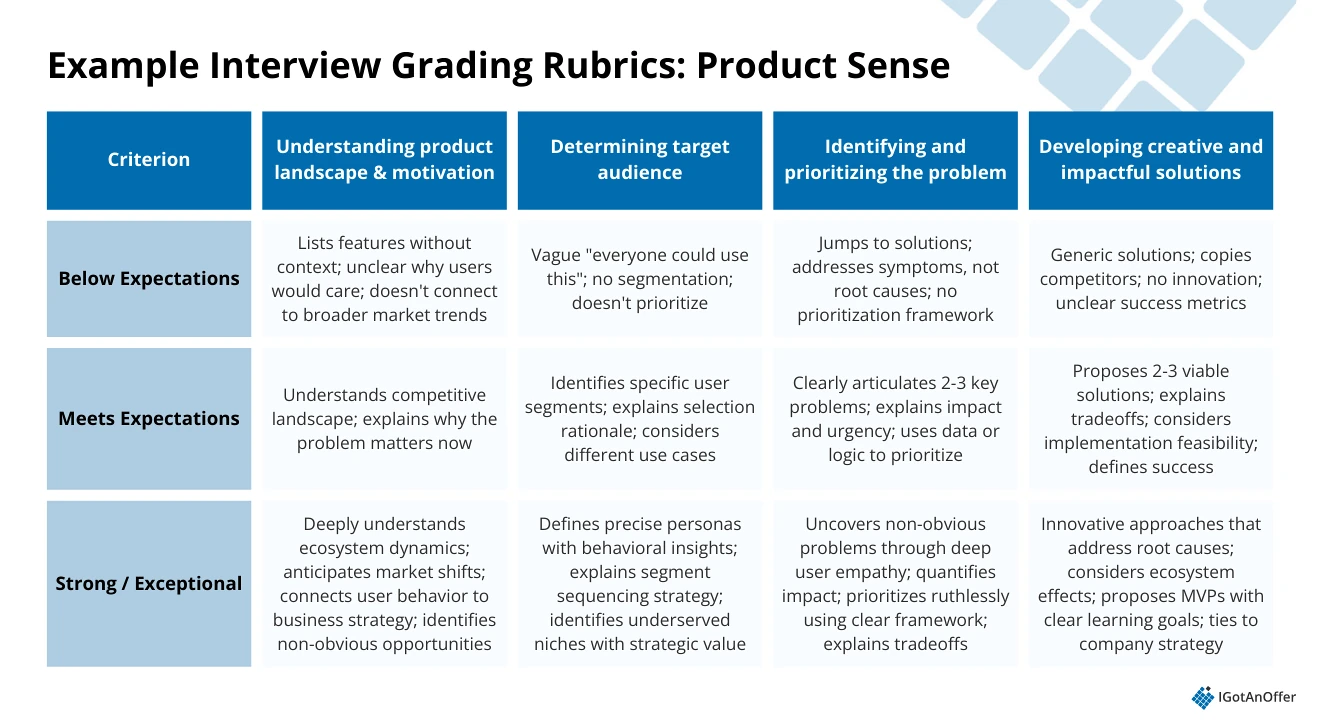 Analytical Thinking / Product Execution
Analytical Thinking / Product Execution
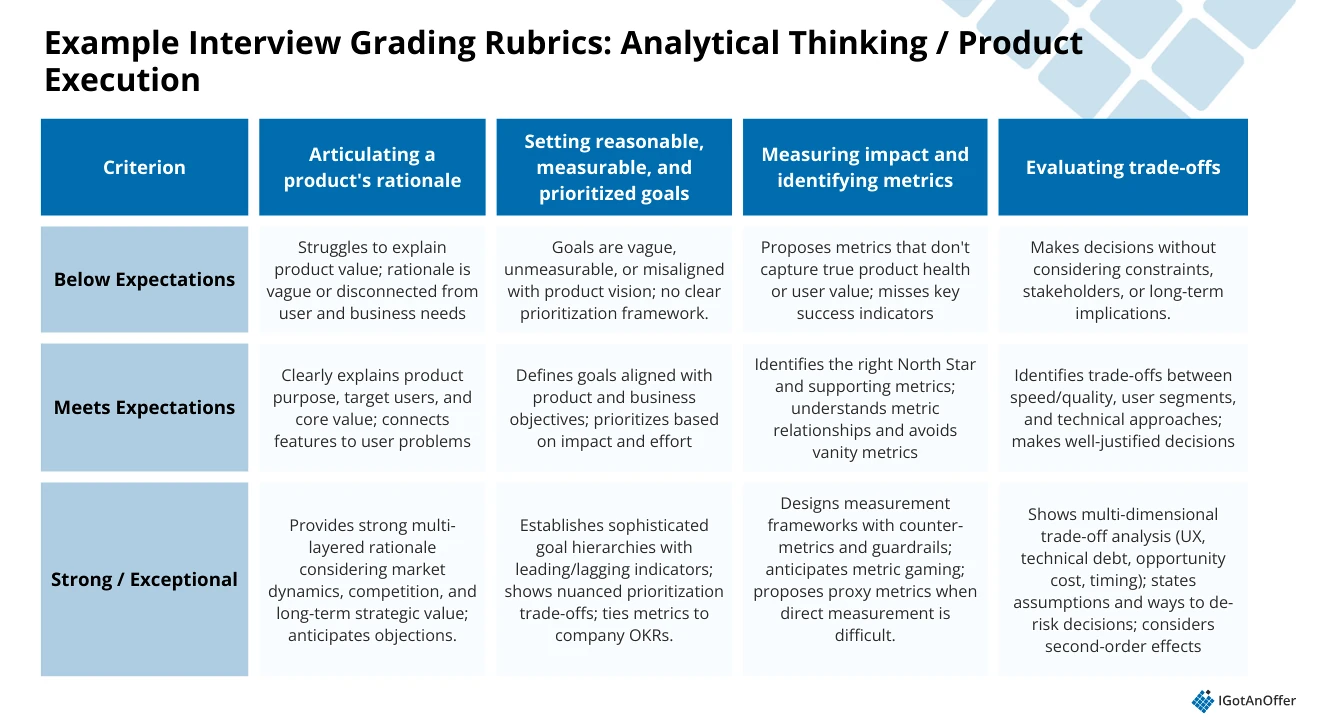
Click here to download the example PM interview grading rubrics (PDF)
In addition to the scores, interviewers also submit a summary note, such as “Soft no,” “Suggest re-evaluate,” or “Strong yes,” which can significantly influence the hiring decision.
Post-evaluation
Once all evaluations have been submitted, there are three possible outcomes:
- You move forward for approval if most interviewers recommend “Hire” or “Strong Hire”
- You may be asked to complete follow-up interviews if feedback is mixed or additional information is needed
- You are rejected if there are multiple “No hire” or “Strong no hire” recommendations
After the post-evaluation stage, candidates who pass the hiring committee move on to leveling and team matching.
5. Meta product manager interview tips from senior PMs ↑
Mark is a Senior PM formerly of Meta (and Google) and ran 100+ PM interviews during his time there. Astika was also a senior PM and interviewer at Meta. They're now among the top coaches on our platform and have helped hundreds of candidates just like you ace their PM interviews.
We asked Mark and Astika for some specific tips to help you pass your Meta product manager interviews. This is the list they came up with.
# Tip 1. Understand the company's mission and products
Familiarize yourself with Meta's mission statement, core values, and the range of products and services it offers. Highlight how your work can contribute to its goals.
"In product design questions, you're going to literally want to cite the company's mission back at them. If you're interviewing remotely, write it on a post-it note and stick it on your laptop!" says Mark.
#Tip 2: Product design/sense is key
Expect questions that assess your ability to ideate, design, and improve products. Practice structuring your thoughts on identifying user needs, envisioning features, and prioritizing them based on impact.
Meta also places a strong emphasis on user empathy. You must show that you can design for a wide range of users and make thoughtful trade-offs.
“You'll need to use strong prioritization criteria to justify why Meta would build something, demonstrate alignment with Meta's overall mission and strengths, and show a strong understanding of the risks that may come throughout the process," says Astika.
Learn more in our guide to cracking Meta product sense interviews.
#Tip 3. Showcase leadership
Meta wants to hire candidates who can inspire and lead. In behavioral interviews, be ready to discuss instances where you've taken initiative, made tough decisions, and led projects to success.
Showing leadership isn't just for behavioral questions. You should conduct every interview like a leader. Always check in with the interviewer instead of trying to get them to show you the way.
"Don't ask the interviewer, 'Here's my segmentation, what do you think?’ You need to be more confident. Say, 'Here's my segmentation, and I'm going to choose this segment because of X. Ok?' says Mark.
#Tip 4. Practice data-driven decision-making
Be prepared to answer questions that require data interpretation and making data-driven decisions. You should familiarize yourself with basic metrics for product success (e.g., adoption, engagement, quality, etc.) and have a few methodologies in mind for tackling growth, engagement, and scalability issues.
“Often, I think people don't think enough about retention, and especially at Meta, that's a huge metric, and it's becoming more important at different companies too," says Mark.
#Tip 5. Get enough technical proficiency
Meta doesn't require its PMs to be as technical as other companies do (only 50% of its PMs hold a technical degree). But a solid understanding of software development processes, system design, and technical challenges is crucial.
Be able to discuss technical trade-offs and work effectively with engineering teams.
"You need to understand how the big blocks work together. You don't need to know how to code, but you do need to know how things kind of actually work and be able to communicate about them," says Mark.
#Tip 6. Understand user experience (UX)
Demonstrating a keen sense for UX design and user psychology is important. You should be able to critique existing designs and propose improvements grounded in user research.
"You should be able to create wireframes and mock-ups. Take a piece of paper with you to the product sense interview and be ready to scribble out a rough design," says Mark.
#Tip 7. Practice behavioral questions
Prepare for questions about past experiences that illustrate your problem-solving skills, leadership, teamwork, and resilience.
Use the STAR method (Situation, Task, Action, Result) or, as we always recommend to candidates, IGotAnOffer’s SPSIL method (Situation, Problem, Solution, Impact, Lessons) to structure your answers.
You should also time your answers and make sure they're five minutes or less, as that’s typically the time boundary interviewers are looking for.
“No matter what company you're targeting, you can use Amazon's leadership principles as a guide and make sure your answers always hit at least one of these principles,” says Mark.
Learn more about the SPSIL framework and why we think it's better than STAR, in our guide to STAR method for PM Interviews (why it’s NOT the best).
#Tip 8. Soft skills can elevate your candidacy
The difference between a good candidate and a great candidate often comes down to how well you demonstrate key soft skills. This includes your ability to build strong relationships not just within your immediate team, but also with cross-functional partners and leaders.
Show that you can lead without authority, and stay flexible as priorities change. “You should demonstrate that you can evangelize for the team and the product, and show strong customer empathy, strong conflict resolution skills, and strong long-term thinking,” says Astika.
#Tip 9. Stay informed about tech trends
Being knowledgeable about recent technological advancements and industry trends can help you bring fresh perspectives to the table. This demonstrates your enthusiasm and commitment to staying relevant in a fast-paced field.
"I recommend TechCrunch for fairly light reading, and Ben Thompson's Stratchery blog to get a lot deeper," says Mark.
#Tip 10. Mock interviews are crucial
Practice with peers, but also try to use platforms that offer mock interviews with current or former PMs from Meta. Feedback from these sessions can be invaluable in identifying areas for improvement.
"I think the quality of feedback you get from a professional mock interviewer is just way, way higher than with a friend or peer," says Mark.
#Tip 11. Thank your interviewer
It's a small thing, but when you finish the interview and can breathe a sigh of relief, the interviewer still has to spend an hour writing up their evaluation.
"Show your appreciation of their situation, and you'll demonstrate a key PM skill: empathy!" says Mark.
Watch the video below if you want to see Mark give his insights and advice with more detailed explanations:
6. How to prepare for Meta product manager interviews ↑
We've coached more than 21,000 people for interviews since 2018. There are essentially three activities you can do to practice for interviews. Here’s what we've learned about each of them.
6.1 Learn by yourself
6.1.1 Learn about Meta
Learning by yourself is an essential first step. As you've probably figured out from the example questions listed above, you can't become a PM at Meta without being familiar with the company's products and its organization. You'll therefore need to do some homework before your interviews.
Here are some resources to help you get started with this:
- Meta's 6 core values (by Meta)
- Facebook’s “hacker culture” (by Mark Zuckerberg, via Wired)
- Meta annual reports and strategy presentations (by Meta)
- Meta's approach to tech trends (by CB Insights)
- Meta org culture analysis (by Panmore Institute)
It’s also important to understand Meta’s product ecosystem, user base, and business priorities, as interviewers often expect candidates to reference these during discussions. To help with this, we’ve put together these interview fact sheets that you can reference during prep.
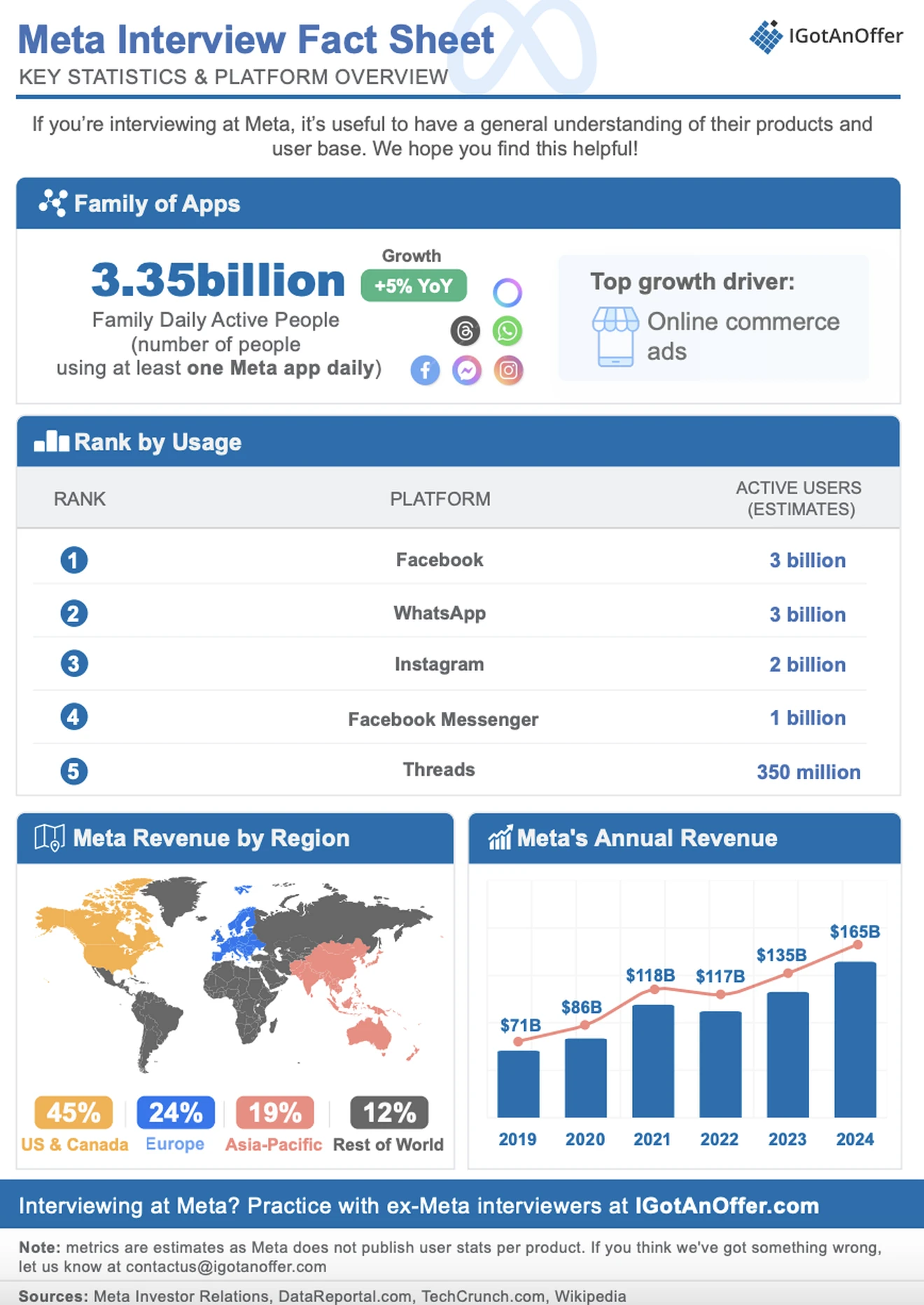
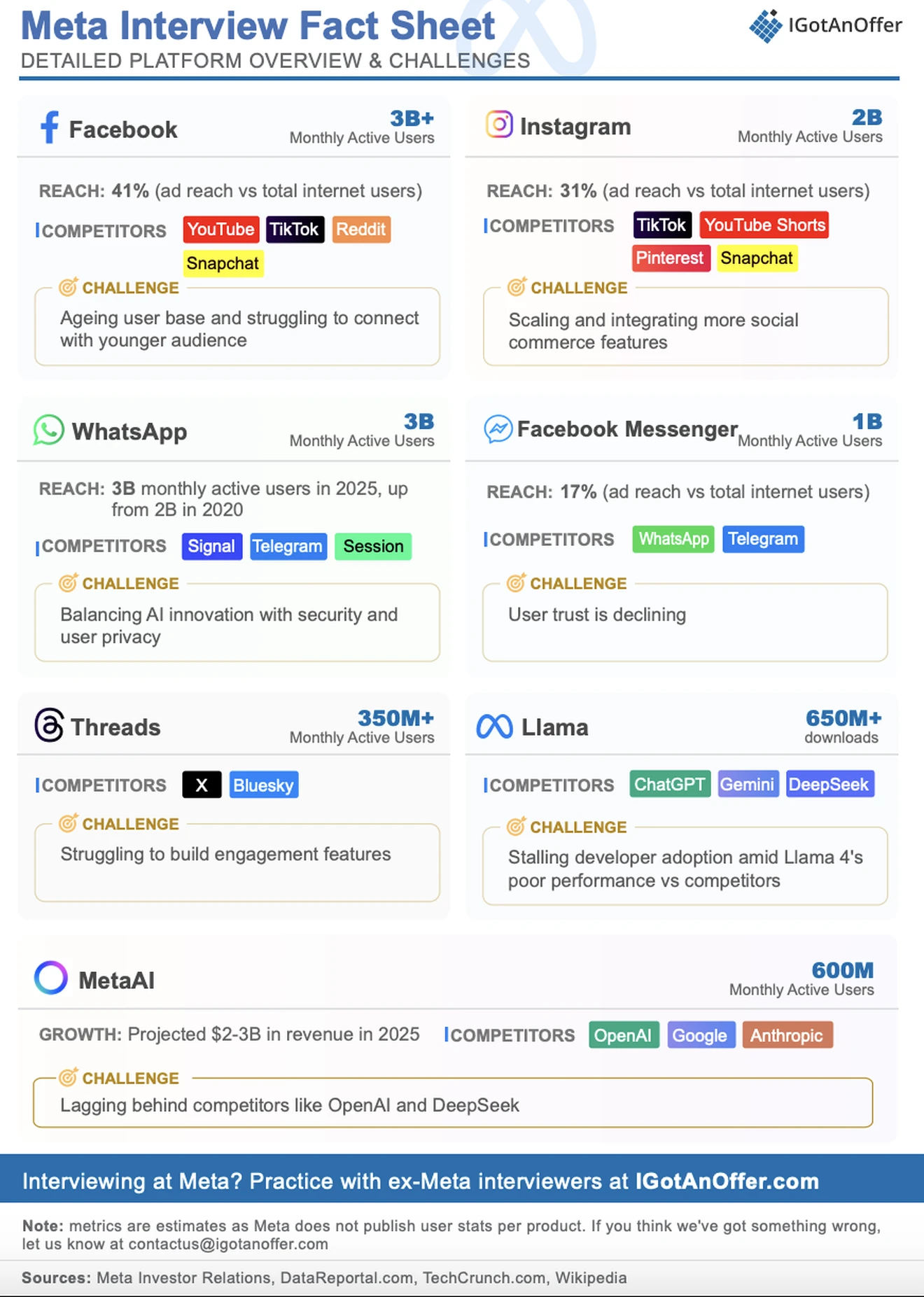
Click here to download the Meta interview fact sheets
6.1.2 Deep dive into product management topics
As mentioned previously, Meta will ask you questions that fall into certain categories, like behavioral, design, strategy, estimation, and metric questions. Approaching each question with a predefined method will enable you to build strong interview habits.
Then, when it comes time for your interviews, these habits will reduce your stress and help you to make a great impression.
If you’re just looking for a jumping-off point, you can start learning about the different question types you’ll need to master in the following PM interview guides:
- Behavioral questions
- Product design questions
- Product improvement questions
- Favorite product question
- Strategy questions
- Estimation questions
- Metric questions
- Prioritization questions
- Meta project retrospective interview guide
It's a long watch, but we recommend watching this video by Meta. It's designed to help you with your initial interviews, and includes a mock product sense and analytical thinking interview from a Meta PM. You can also watch some of our Meta PM mock interviews on YouTube.
We have an article on what a real Meta interview experience is like, with success stories from people we've worked with. Check that out to get some prep best practices from successful candidates.
Some people ask us if we offer prep courses. We don't, but if you'd like to buy one, we'd recommend the Product Alliance Flagship Meta PM course. It has some great Meta-specific insights and goes into pretty good detail.
Once you’re in command of the subject matter, you’ll want to practice answering questions. But by yourself, you can’t simulate thinking on your feet or the pressure of performing in front of a stranger. Plus, there are no unexpected follow-up questions and no feedback.
That’s why many candidates try to practice with friends or peers.
6.2 Practice with peers
If you have friends or peers who can do mock interviews with you, that's an option worth trying. It’s free, but be warned, you may come up against the following problems:
- It’s hard to know if the feedback you get is accurate
- They’re unlikely to have insider knowledge of interviews at your target company
- On peer platforms, people often waste your time by not showing up
For those reasons, many candidates skip peer mock interviews and go straight to mock interviews with an expert.
6.3 Practice with experienced PM interviewers
In our experience, practicing real interviews with experts who can give you company-specific feedback makes a huge difference.
Find a Meta product manager interview coach so you can:
- Test yourself under real interview conditions
- Get accurate feedback from a real expert
- Build your confidence
- Get company-specific insights
- Learn how to tell the right stories, better.
- Save time by focusing your preparation
Landing a job at a big tech company often results in a $50,000 per year or more increase in total compensation. In our experience, three or four coaching sessions worth ~$500 make a significant difference in your ability to land the job. That’s an ROI of 100x!






